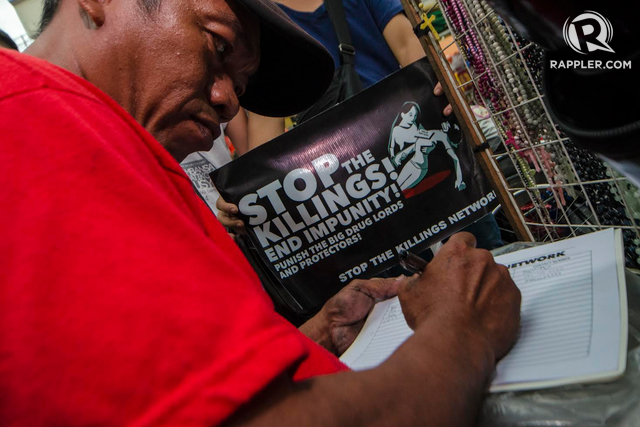Shoot to kill? Duterte's statements on killing drug users
STOP
THE KILLINGS. President Rodrigo Duterte has been careful in his
statements endorsing the killing of drug users, but human rights groups
say he 'implicitly' supports killings in violation of due process. Photo
by Rob Reyes/Rappler
MANILA, Philippines – It has been a common refrain between
the government and its critics: the latter decries President Rodrigo
Duterte's "shoot-to-kill" orders against alleged drug users, while the
former denies there ever was such a thing.
As human rights groups, international media, and diplomats begin to take increasing notice of the number of drug-related deaths in the Philippines, it comes with criticism against what they perceive as the government's tacit endorsement of extrajudicial killings.
The harrowing images have been splashed across
international news outlets: photos of slain people with their faces
wrapped in tape, usually beside a cardboard sign saying: "I'm a drug
pusher, do not emulate me."
But the relatives of some of the victims insist that their loved ones did not fit the profile of a drug user, or were simply at the wrong place at the wrong time.
One US senator said Duterte was endorsing
"what amounts to mass murder." Human rights groups point out that
vigilantes have grown emboldened because of Duterte's many statements
defending and even promoting the killing of alleged drug users who fight
back.
Even before the start of the campaign period for the May 2016 polls, Duterte had already promised to order the killing of criminals. But he emphasized that this should only be done if they fight back.
This caveat has been the government's consistent defense against criticism that it endorses extrajudicial killings.
Shoot to kill, DIY arrests
Duterte has long been vocal about his hardliner stance
against illegal drugs. His campaign threats to kill drug users, he said,
were not rhetorical.
Several months since the May polls, the Philippines is
seeing the concrete evidence of that statement: thousands have been
killed in Duterte's bloody war on drugs, some of them under questionable
circumstances. (READ: 'Nanlaban sila': Duterte's war on drugs)
In May, shortly after winning the elections, Duterte said he would give security forces "shoot to kill" orders against those who resist arrest.
He also said he would offer million-peso bounties for the capture or death of drug lords.
But he was quick to add: "I'm not saying you kill them but the order is 'dead or alive.'"
The President has made several pronouncements in the same
vein, issuing shoot-to-kill orders but immediately clarifying that it
should only be done if the suspects resist arrest.
He has made this call not only to law enforcers, but to
ordinary citizens. In June, during a thanksgiving party in Davao City,
Duterte endorsed the idea of ordinary civilians engaging in do-it-yourself arrests.
"Kayong nandiyan sa neighborhood ninyo (Those
among you in your respective neighborhoods), feel free to call us, the
police, or do it yourself if you have the gun, you have my support," he
said.
If a suspect resists arrest, "you can kill him," Duterte said.
The President added, "Only if your life is in danger, at lumaban, at may baril din at kutsilyo, barilin mo (and there is resistance and the suspect is armed with a gun or knife, shoot). I'll give you a medal."
(source: http://www.rappler.com/newsbreak/iq/148295-philippines-president-rodrigo-duterte-statements-shoot-to-kill-drug-war)

Walang komento:
Mag-post ng isang Komento